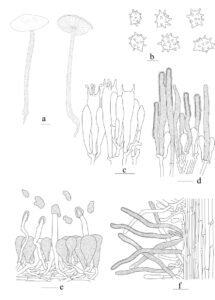Fungalpedia – Note 531, Cibaomyces
Cibaomyces Zhu L. Yang, Y.J. Hao & J. Qin
Citation when using this data: Tibpromma et al. 2024 (in prep.) – Fungalpedia, Macrofungi, Mycosphere.
Index Fungorum, Facesoffungi, MycoBank, GenBank, Fig. 1
Classification: Physalacriaceae, Agaricales, Agaricomycetidae, Agaricomycetes, Agaricomycotina, Basidiomycota, Fungi.
Hao et al. (2014) introduced Cibaomyces as a new genus in Physalacriaceae to accommodate the new taxa Cibaomyces glutinis as the type species, based on morphological characteristics and phylogenetic analyses of combined ITS and LSU genes. Cibaomyces has only one accepted species (C. glutinis), which was collected from Yunnan Province, China, and is characterized by collybioid to tricholomatoid basidioma, pileus viscid, sinuate to subdecurrent, relatively distant and with brown lamellar edge hymenophore, sticky and densely covered with felted squamules stipe, thin-walled, ornamented with finger-like projections basidiospores, nearly cylindrical, thin-walled, and often heavily incrusted cystidia. Hao et al. (2014) also showed that Cibaomyces was related to Gloiocephala, Laccariopsis, and Rhizomarasmius.
Type species: Cibaomyces glutinis Zhu L. Yang, Y.J. Hao & J. Qin
Other accepted species: This genus is monotypic.
Figure 1 – Features of Cibaomyces glutinis. a Basidiomata. b Basidiospores. c Basidia. d Cheilocystidia. e Pileipellis. f Surface of stipe and caulocystidia. Scale bar: a = 1 cm, b = 10 μm, c-f = 20 μm. Redrawn from Hao et al. (2014).
Reference
Entry by
Lu W, Excellence Center of Microbial Diversity and Sustainable Utilization, Department of Biology, Faculty of Science, Chiang Mai University, Chiang Mai 50200, Thailand; Center for Yunnan Plateau Biological Resources Protection and Utilization, College of Biological Resource and Food Engineering, Qujing Normal University, Qujing, Yunnan 655011, China
(Edited by Saowaluck Tibpromma, Samaneh Chaharmiri-Dokhaharani, & Achala R. Rathnayaka)
Published online 9 December 2024
